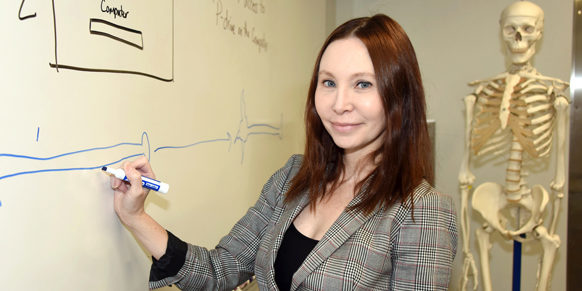
Classroom Connections Bolster Scientific Understanding
As a young person, Karri Haen Whitmer had a profound fear of public speaking. “I dropped out of my undergraduate speech class at least once before I was able to finish the requirement,” she says. “I remember being called on to speak and only shaking my head no to indicate to the professor I wasn’t going to do it. I definitely did not plan on teaching large classes at the university level.”
Yet Haen Whitmer, associate teaching professor in genetics, development and cell biology, conquered her fear. And in 2019, she received the Iowa State University College of Agriculture and Life Sciences’ Excellence in Teaching by Lecturers and Adjunct Faculty Award.
Haen Whitmer earned her bachelor’s degree in microbiology and chemistry at Kansas State University. She got her feet wet in front of a classroom as a teaching assistant and lecturer while working on her master’s in plant sciences at North Dakota State University. When she moved to Iowa State University, she taught both human anatomy and comparative anatomy for four years while working on her doctorate in genetics.
In 2012, she began teaching large foundational courses for the genetics, development and cell biology department. Since then, she’s taught about 1,000 students annually.
Each fall she teaches 250 students in two sections of Biology 255— Fundamentals of Human Anatomy. In the spring, she teaches 350 students in two sections of Biology 256— Fundamentals of Human Physiology. Both courses also are offered summers, with about 40 students enrolled in each. Haen Whitmer also is course director for the Biology 256 Laboratory, with about 380 students.
“It doesn’t matter if I’m teaching four or 400, I can’t envision doing anything else,” she says. “On the first day of class, I tell them the study of basic anatomy and physiology is an ongoing and immensely important part of the human health sciences,” she says. “In history, we find the discoveries of previously overlooked, seemingly trivial, details have resulted in some of the greatest changes in our scientific understanding.”
Haen Whitmer strives to provide students with critical thinking skills, a thorough understanding of scientific methods and an authentic view of scientific change.
“It is our willingness to disregard old perspectives about who and what we are that drives our continued advancement in the field of human medicine,” she says. Senior Lauren Kuper took both human anatomy and physiology courses from Haen Whitmer.
“She makes her lectures more than just a classroom setting,” Kuper says. “She takes time to explain important topics in detail, while adding real life examples to connect what we are learning to situations we may face in future jobs or schooling.”
Another student who took classes from Haen Whitmer is junior Nicolas Ronkar. “She always makes the main points clear and slips in a couple of jokes or side comments that are funny or interesting,” Ronkar says. “She also is extremely attentive to her students.”
Both courses also are offered online. Besides distance education students, the online option has become popular with on-campus students, with the two sections enrolling as many as 350 students each year.
In 2016, Haen Whitmer started replacing the older Biology 256 lab curriculum with research-based modules. This year, she received a grant that allowed her to create a cohesive lab text that includes chapters on scientific method, conducting literature searches, human subject experimentation, introductory statistics and scientific presentations.
Each week, students in the laboratory course are presented with a scientific problem and asked to speculate about an experiment they could perform. Then they conduct a version of the experiment and discuss whether the results were as expected. For the past three summers, Haen Whitmer has taught several weeklong outreach courses for high achieving students in grades 9-11.
“I’m a huge fan of talented and gifted (TAG) programs,” she says. “I entered TAG in the third grade and remained a TAG student through high school. Those experiences gave me the confidence I needed to pursue higher education.”
Last summer she taught introductory biology for Upward Bound, a college preparatory program at Iowa State for first generation or income-eligible high school students. She had nine students divided into two sections of the three-week course.
“I was a first-generation college graduate, so I could easily relate to this group,” she says. “My goal was to provide the students with exemplary academic enrichment opportunities, along with some practical advice regarding the transition to higher education.”
“It’s really important to me to have these personal mentoring experiences,” says Haen Whitmer. “Outreach opportunities provide me with greater insight into how young students think and learn, which positively impacts my university practices.”



